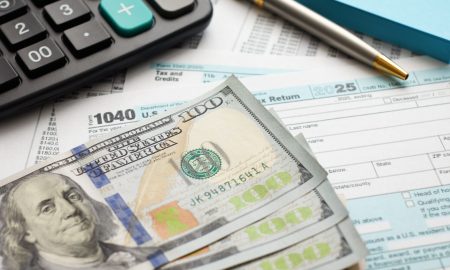My property taxes have ballooned 134% over my 20 years of homeownership. It seems like every year I grumble about another increase, pay the bill and move on. Recent data, however, has me rethinking my approach — it turns out I might be leaving serious money on the table.
More than 40% of properties in the U.S. could save $100 or more — and sometimes much more — with a property tax appeal, according to a Realtor.com analysis. For millions of homeowners, the savings could add up to about $539 annually, and that’s just for a median property. You could save more (or less) depending on where you live.
“Somewhere between 3% and 5% of homeowners actually file an appeal, and of those, between 30% and 50% win some kind of reduction,” says Pete Sepp, president of the National Taxpayers Union, a nonprofit, non-partisan taxpayer advocacy organization based in Washington, D.C. In other words, there’s a real chance to save money.
Take Tomball, Texas-based homeowner Russell Lindley, who has appealed property taxes for 10 of the 11 homes he’s owned with his wife. He says he’s succeeded more than half of the time.
“Why would you allow them to assess a value on your house and not protest to try to save money?” he asks. “The largest property tax reduction I received was approximately $3,000 in a single year.”
Filing a formal request asking your assessor to review and possibly lower your home’s assessed value — and, in turn, your tax bill — can be a chore, but it can also put substantial money back in your pocket.
Even long-time housing reporters like me can miss opportunities to save money, and now I’m on a mission to help you avoid my mistake. Let’s break down what happens before, during and after the appeals process so you have the best shot at lowering your tax bill.
The assessment process isn’t perfect
Before we dive into property tax appeals, let’s step back and pull back the curtain on what went into determining the amount on that dreaded tax bill to begin with.
While every state, county or township uses its own formula to assess property value, one thing is the same: Property tax assessments typically rely on mass data, not a personal inspection of your home.
“They basically put in all the data and spit out all the numbers,” explains Colton Pace, co-founder of Ownwell, a company that helps homeowners appeal their property taxes. “It works much of the time, but it inevitably produces misdiagnoses. That means the model often misses unique property traits, interior condition or hyper-local market nuances.”
Armed with that data, the assessor sets your home’s assessed value, multiplies it by the local tax rate (set by your city, county, or school district), and voilà, that’s your property tax bill.
“It’s not necessarily evil intent or anything like that,” Sepp says. “It’s just that there are a lot of properties to assess and local governments have to figure out a way to do that quickly and efficiently.”
2 steps to building and winning your appeal
So what exactly does it take to build a successful case? Sepp advises homeowners to begin with evidence-based homework, focusing on two key aspects: the accuracy and comparability of the property’s assessment.
Are there any mistakes in the assessment?
“Accuracy has to do with simple errors the assessor makes,” Sepp says. “There are only two bathrooms in your house, not three. It’s a one-car garage, not a two-car garage. Sometimes you can bring those up with the assessor without even filing a formal appeal. You may be able to call them and say that this just isn’t right.”
Keep in mind:
Your property record card can be a goldmine. You can get that online through your city assessor’s site or by contacting your local tax assessor. Look for mistakes like incorrect square footage, or the wrong number of bathrooms or bedrooms. Even small errors can significantly affect the assessed value of your home, providing you with more ammunition.
In the appeal, you can (and should) include photos, repair estimates or contractor quotes to show your home’s true condition. Sepp says some things, like an outdated 1980s kitchen, probably won’t move the needle because they are subjective. But clear, tangible issues, like multiple leaks in your roof? Absolutely.
How does your house compare to similar homes?
The next case builder is researching the comparability of the assessment, which involves looking at recent sales of similar homes in your neighborhood.
“Look up the values, not only the sale values, but the values the assessor has for similarly situated properties in your neighborhood,” says Sepp. “What are five, better yet, 10 properties in your neighborhood that were assessed? ‘What were their levels on a per square foot basis, and do they compare with your property’s assessment on a per square foot basis?’
If there’s a big difference, and by big I mean 10% or more, then you have solid proof to make your appeal.
— Pete Sepp
President of the National Taxpayers Union
But here’s where things can get a little tricky. Some areas use a fractional assessment system, meaning your property isn’t taxed on its full market value. Instead, they tax a percentage of your property’s market value, like 90%, for example. Because of the methods used, it can be harder to compare your property’s assessed value to recent home sales. Another important consideration: In most jurisdictions, the sale price of your home isn’t considered the same as the assessed value, and those numbers can be wildly different.
Chang Fu learned this lesson firsthand. When Fu and his wife lived in Seattle, he successfully appealed his property taxes in 2019 by using his home’s sale price as evidence, saving $1,000 a year. When he moved to Austin, Texas, he tried the same approach when appealing his property taxes in 2025 and was denied. Now in arbitration, Fu is confident he can present a stronger case by comparing his property’s assessment to that of similar homes as well as its current market value.
“I literally have six neighbors in my cul-de-sac and my six neighbors all have lower [home] values,” says Fu. “I’m hoping to get a fair arbitration and, ideally, a positive outcome so I can pay similar property taxes as my neighbors.”
An appeal could send your bill down … or up
Nobody wants to pay higher property taxes. The reality, however, is that appealing your taxes won’t always lead to a lower bill. In rare cases, a closer look could show that your home was underassessed. So before blindly appealing, do some preliminary research to see that you don’t inadvertently draw attention to any errors in the original assessment that could work against you. The assessor may also discover home improvements that weren’t previously reported, potentially raising your home’s assessed value. But still, if you believe your assessment is incorrect, it doesn’t mean you shouldn’t try to appeal.
The burden of proof isn’t always on you
The success or failure of your appeal could have a lot to do with where you live. For example, in Indiana, if the assessment has increased by more than 5%, it’s up to the assessor to prove their findings are correct. As Pace notes, homeowners in assessor-burden-of-proof states like Indiana tend to have much higher appeal success rates. While that might sound like an advantage, it doesn’t mean homeowners don’t have to do any research.
“Even if the assessor has the burden of proof that, that doesn’t mean you have the ability to say, ‘Well, I think [my house] should be valued at $1,’” says Sepp. “You have to have some kind of basis to say, ‘He [the assessor] says he’s proven his case. Here’s why I disagree.’”
The not-so-good news? Pace says that in approximately 80% of geographies, the responsibility for proving the case flips to property owners or the tax agent, which is the company helping the homeowner with the appeal. This can make it harder for homeowners to win, and as Pace explains, “This is a higher burden than convicting someone of a crime. It’s not [just] beyond a reasonable doubt. You have to completely show that they are wrong.”
While it’s not impossible to win in these cases, research and preparation are critical.
The appeals process isn’t as intimidating as you think
The idea of appealing your property taxes can sound daunting, but Sepp says it’s not as scary as it seems.
“It’s not as if you’re going to be put before a tribunal and interrogated about all of the features of your house,” he says. “Most assessment appeals processes are set up to be no more difficult than traffic court. If you feel you got a parking ticket that you didn’t deserve, you gather evidence to show why you feel that way, and you present it to a panel that’s hearing a couple of dozen of these things a day. You’re not on trial. You’re simply being asked to present evidence of why you have the opinion you do.”
The process of appealing has also become easier with services that provide comparable property assessments and online access to records. “Even in the assessor’s office itself, there are AI tools that can probably help you with preparing an appeal,” says Sepp. “And in some jurisdictions, which occurred a lot during COVID appeals, hearings are often held online, or you can file an appeal by mail.”
After the appeal, you’ll receive a written notice of the decision and the reason behind it. If you disagree, you can often appeal to a higher board. The total time frame varies depending on where you live and the complexity of the case.
You can go it alone or get assistance
Nothing says you can’t DIY your property tax appeal. Many homeowners, like Fu, go that route. “If you’re comfortable doing it yourself, go do it,” he says. Keep in mind that you will likely have to pay a small appeal fee, which can vary depending on where you live or the value of the property.
But if you’d rather not go it alone, there are companies, like Ownwell, that offer professional assistance, charging a fee only if they successfully reduce your tax bill. “You hire a doctor to solve your problems, why not hire an expert?” says Lindley, who used property tax negotiation services for most of his property tax appeals. “You don’t pay money unless they save you money. It always seemed like a no-brainer to me.”
If your situation is complicated or you have a high-value property, Amy Loftsgordon, legal editor at legal resource Nolo, says it might make sense to hire an attorney or a reputable tax reassessment company. However, she cautions homeowners against using reassessment companies that try to solicit business from you.
“They send out notices that look something like a tax bill and say you might be entitled to reduce taxes,” says Loftsgordon. “This is without making it very clear that they’re a profit company and that [a property tax appeal] is something that you can indeed do on your own. Typically, a reputable company isn’t going to send you tricky advertising or contact you.”
Move fast on the appeal; the clock is ticking
Once you get that property tax assessment notice in the mail, don’t wait to act on it. While the proposed assessments may take effect in the upcoming fiscal year or the latter half of the current one, it doesn’t mean you have plenty of time to respond.
“Typically, when you get the thing in the mail, you have between 30 and 60 days to either give notice or file your appeal,” says Sepp. “If you have a 30-day deadline to file an appeal, it may be a very simple matter of filling out a form that says, ‘I disagree with my assessment because it’s overvalued compared to other properties.’ You may not have to submit all of your evidence at that point. You just have to put in the appeal, then your hearing date will be scheduled. It then triggers another two weeks or so for you to file all of your stuff online or through the mail.”
Miss the deadline, and you’ll have to wait until next year to challenge your assessment. Property values and market conditions can change, so it’s worth reviewing your notice carefully each year. And nothing says you can’t appeal every year if you believe your assessment is consistently too high.
The bottom line
Appealing your property taxes might sound tedious, but it’s a commonly overlooked way to save money as a homeowner. “Making the assumption that the government has done its homework would be a mistake,” Sepp says.
I will be tackling my own appeal next year, so stay tuned for that. The key takeaway? Don’t assume your bill is set in stone. Taking the time to double-check your property assessment and file an appeal when the numbers don’t add up can translate into hundreds, even thousands, of dollars in savings every year. Your wallet will thank you.
Why we ask for feedback
Your feedback helps us improve our content and services. It takes less than a minute to
complete.
Your responses are anonymous and will only be used for improving our website.
Help us improve our content
Read the full article here












